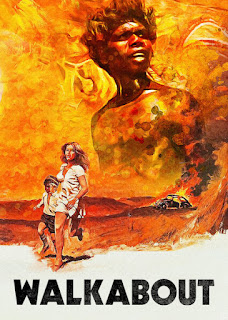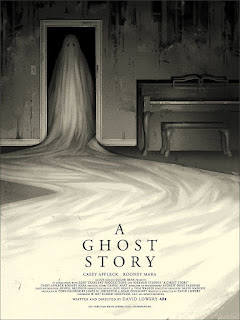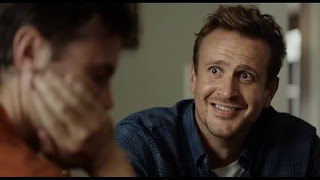What the hell am I talking about with that subject?
Well I'll get to that in a moment, but first, a little prologue.
And also:
Dune spoilers to follow.
So I figured the perfect way to wrap up my Dune experience of the past three months -- which started with my October viewing of Jodorowsky's Dune, followed by the concurrent reading of Frank Herbert's novel and viewing of the Denis Villeneuve adaptation -- was to go back and watch the David Lynch film that I thought was so hilariously awful when I watched it 15 years ago. Almost exactly 15 years ago, in fact. My records surprised me by showing that I watched the 1984 Dune on January 26, 2007.
On January 28, 2022, I watched it a second time, and you'll be glad to know I got more out of it having read the book. That still doesn't excuse the poor storytelling choices, which I think would be completely lost on someone who wasn't familiar with the material (which described me in 2007), but it's not the inept mess I once made it out to be. It just has some really funny individual choices that stand out and fatally undercut it.
But first, what the hell am I talking about with that subject?
As I was watching Dune I determined Denis Villeneuve must have had a crush on Sean Young when he was growing up. I noticed that Young plays Chani, the role assumed by Zendaya in the Villeneuve remake.
What else do we know about Young? Well, her most memorable role was probably as the android Racheal in Blade Runner -- a film Villeneuve has also rebooted.
Now 54, Villeneuve would have been about 15 when Blade Runner came out and about 17 when Dune came out. Good ages to still be working out your crushes, methinks.
My natural conclusion is that Villeneuve is working on a remake of Ace Ventura: Pet Detective -- where Young plays Lois Einhorn/Ray Finkle -- right about now. (If you have a different choice for the third most prominent role in Young's career, don't tell me.)
Some other thoughts:
I didn't know who Sting was
Even after finishing the book and getting to this character's big scene, I didn't actually know who Sting was supposed to have played in the movie until watching it on Friday night.
Now obviously, the portrayal of the other Harkonnens, in both the book and Villeneuve's film, makes them out to be corpulent and repugnant, even potentially unable to walk on their own without the use of suspensor suits. That would not describe the image of Sting in this movie, which shows every inch of the physical discipline that makes him excel at tantric sex, as his body is lean and finely chiseled -- a fact we can't help but notice as he is pictured wearing only the interstellar version of a speedo.
But maybe it's an indication of the weird role Feyd Rautha Harkonnen plays in the book that made me unable to initially make the connection. His role is very backloaded, so much so that Villeneuve did not even feel the need to introduce him as a character in his adaptation of the novel's first half. Even Herbert's book would have no use for him until its final 20 pages if it had not introduced him in a random scene just after the halfway point, a scene that seems there only to lay groundwork so his role in the novel's climax does not feel so out of left field.
Maybe the film's peculiar usage of Sting -- which was actually straight out of Herbert's text -- was one of the things that prompted me to judge the film so harshly. I was like "You've got Sting, and then you barely use him?" I should have directed that question to Herbert probably.
The whispered voiceover still sucks
One of the byproducts of needing to fit so much novel into only 137 minutes of movie was that Lynch had to take shortcuts in his exposition, the most famous of which was to have the characters' thoughts appear in voiceover. More often than not, these are whispers -- an apparent attempt to remind us they are only thoughts, though I don't know how that could escape us given that the characters' mouths aren't moving.
More than any other questionable decision Lynch made, this was the one that really undermined my ability to appreciate the film, and in fact turned any instinct to appreciate it into derisive laughter. It just doesn't work, and 15 years later, it still doesn't work.
I guess the main difference now, though, is that I understand this was not just a bad creative choice. It was an attempt to solve the unsolvable problem of how much information needed to be communicated in such a short amount of time. Villeneuve solved that problem by turning the story into (an expected) two movies, each of which will be longer than Lynch's film. Lynch wouldn't have had that option in 1984.
I think the funny thing about it is that so many different characters' thoughts are heard this way. If it were limited to the main character, Paul, that probably would have been more defensible. But even random side characters we've only just met reveal their thoughts to us. There just had to be another way.
And it seemed like once Lynch had committed to this being necessary, it prevented any instinct to show rather than tell. A number of these thoughts can be deduced from characters' expressions and needn't have been explicated. Like when Kyle MacLachlan gets a stunned look on his face upon first seeing Young's Chani, we don't need to hear via his thoughts that he thinks she's beautiful. Duh. Do you think we've never seen a movie before, David?
I remembered "Remember the tooth!" as funnier
The biggest howler from my first viewing was the scene where Dr. Yueh (Dean Stockwell) implants the poison tooth in Leto Atreides (Jurgen Prochnow) and tells him to "Remember the tooth!" when he crosses paths with Baron Harkonnen (Kenneth McMillan). Of course, I didn't know who any of those people were or what the hell they were talking about in 2007 -- I was already out by this point.
In my memory, the phrase "Remember the tooth!" gets repeated about five times. In reality, it's only said once. But the part that probably really made me laugh at the time -- and did again on this viewing -- was that after Yueh utters the full line, Lynch goes in to a close-up of Stockwell's mouth as he repeats "The tooth! The tooth!"
Still, I had hoped to get more satisfaction from the "Remember the tooth!" moment when a paralyzed Leto does come across Baron Harkonnen. But the word "tooth" doesn't even get uttered again, unfortunately. Leto's thoughts include something like "What did Yueh say?", which is also funny -- if you had just had a poison tooth implanted in your mouth, you would not soon forget it. But it wasn't the awesome sticking of the landing on that bit that I hoped it would be.
Predating Jean-Luc Picard by three years
Patrick Stewart has had a long career, so I could not say for certain that this was his first trip to outer space. But a quick scanning of his credits indicates that indeed, Dune appears to be his sci-fi debut, just three years before he would be chosen as Captain Jean-Luc Picard in Star Trek: The Next Generation.
Did one have anything to do with the other? Hard to say. The internet would probably tell me. I can't be bothered.
The thing I find really funny, though, is that Stewart was cast to play a man of action, a fighter, in Gurney Halleck. Even when he was cast as Picard, it was not because he was seen as deft in hand-to-hand combat. No, his brains and regal quality were what made him right for Picard, not his skills with his fists. Ditto for his work as Professor X.
Fists aren't totally required in this role either, but from the book I know Halleck is considered to be a great fighter, and indeed he does have a sparring scene with Paul in which they are protected by shields.
This might have been one of the funniest scenes, though, as the 1984 visual effects for a personal body shield were so clunky that the bodies of the combatants are almost completely obscured. Maybe that was a blessing in disguise as it hid the fact that this is just not Stewart's forte.
The worm stuff is good
I expected the worms to look like crap. They did not look like crap.
In fact, their breaching of the sand and the flower-like opening of their mouths were accomplished with exceptional technical skill for 1984.
Alas, some of the rest of what's depicted doesn't nearly measure up to it. The visuals involving outer space or green screens are extremely variable in quality.
Overall, a reasonable effort
It was tempting at the time to think that Lynch's famously eccentric sensibilities caused him to wildly misstep in his conception of Dune. The reality is that this is a pretty straightforward attempt to adapt the material, and its greatest sin might be that it's boring.
Indeed, while I definitely thought that a revisit of Dune would be "fun," I found it pretty tedious.
Oh I liked it better for sure. When you know who the characters are and what's at stake, you don't just think this is a hopelessly impenetrable text filled with goofy people saying silly made-up words. That's definitely the impression the uninitiated would get, and did get in 1984.
But I was hoping I would like it a lot better, and that's just not the case. It actually probably needed to be more of a Lynch film rather than less of one to really resonate.
David Lynch himself would tell you that.
***********
One final thought about my three-month Dune experience takes us right back to where we started.
I read all of Herbert's novel certain I was aware of one big spoiler that would not be revealed in Villeneuve's film:
Paul Atreides dies.
It's something that Alejandro Jodorowsky, cheeky bastard that he is, reveals in his conception for what would obviously be one of the film's final scenes. I thought at the time "It's too bad I found that out, but then again, I was the one who chose to watch this movie before I had read the book, and with only a vague recollection of the Lynch film."
If I'd thought to consult those vague recollections of that film, I would have realized I have no memory of Kyle MacLachlan's character dying because you know what? He doesn't.
I obviously got it wrong. He must have been talking about the death of Leto Atreides, a scene with lots of possibilities of how to stage it.
But it's funny in retrospect to have been thinking the whole time how Paul was going to die and how enough stuff needed to happen in the story for the legend of MuadD'ib to have reached sufficiently legendary status before this happened. And when his fight with Feyd Rautha starts near the end of the book, I knew this had to be where he died but also that I didn't think his legend had really grown enough to warrant it in a narrative sense, given all the little chapter-starting histories of Muad'Dib written by the Princess Irulan.
But no, he just sticks a blade in the underside of Feyd Rautha's chin.
So I really have no idea how many of the Dune sequels Herbert wrote Paul will appear in. I may not find out until Villeneuve adapts them, if he does.
Although I ultimately enjoyed the experience of reading Dune -- I thought the appendices were an especially illuminating look into the depths of Herbert's mind and his bottomless capacity for "silly made-up words" -- it was, in the end, a slog to finally finish it so I could move on to my next book.
But whether I get to Dune Messiah or Children of Dune or whatever all the others are called, I feel like I now have a really good understanding of this world, its characters, its unique terminology, and a whole conception of how to give birth to a distinctly considered science fiction franchise.
I'll be back for any and all movies even if I'm not back for any more books, and then I'll at least go into those movies without knowing any spoilers.














